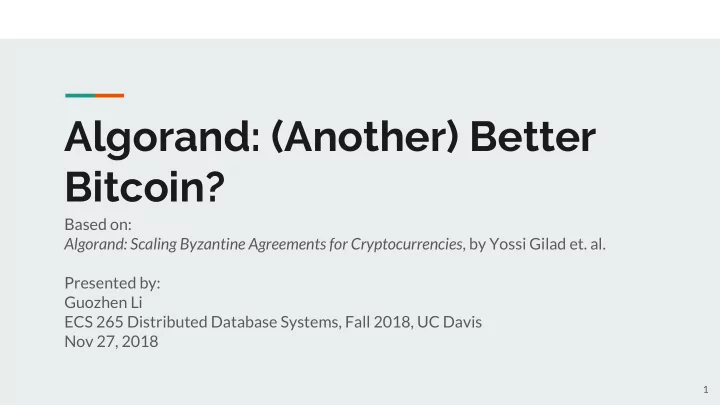

Algorand: (Another) Better Bitcoin? Based on: Algorand: Scaling Byzantine Agreements for Cryptocurrencies , by Yossi Gilad et. al. Presented by: Guozhen Li ECS 265 Distributed Database Systems, Fall 2018, UC Davis Nov 27, 2018 1
What’s bad about Bitcoin Wastes electricity Scalability is questionable ● ● Not really distributed : computing power, Ambiguity : forks can form ● ● thus decision power, (eventually) controlled Slow : transaction takes ~1hr to confirm ● by a few (~5) big mining companies Vulnerable : the big miners are known to ● the world & they have low profit margins → easy to corrupt 2
Algorand vs. Bitcoin Bitcoin Algorand Who decides what value to agree One node that solves a complex Majority vote from a randomly on puzzle fastest selected committee Main assumption Majority of computing power is Majority of funds are held by honest honest users Computation workload on a node Heavy: find a needle in a haystack Light: add, count, compare, sign, verify True decentralization? Not really. Faster nodes have Yes (kinda). Everyone has a chance more power. to vote. 3
Adding a Block in Algrand (when all goes well) 1. A random group of users (e.g. 26 users) each proposes a block based on payments it has observed from gossips, then broadcast its proposal to all users via gossiping. 2. A random committee (e.g. 1000 users) each collects proposals from legit proposers , and broadcast that it votes to the one proposal it heard often enough. 3. A different random committee (e.g. 1000 users) each counts legit votes from the previous committee. For each of them, if one proposal is found to win majority (e.g. over ⅔ of previous committee) votes, that committee member accepts that proposal, and gossip “I accept block X”. 4. For all users, when they hear enough legit committee members say “I accept block X”, they also accepts block X. Thus the network reaches consensus 4
VRF: The Guarantee for Randomness and Legitimacy VRF = verifiable random function Everyone can verify everyone else’s “signed ● winning ticket + proof” pair to determine Everyone runs a “lottery” on its own ● legitimacy The lottery generates a “winning ticket” and ● Everyone only takes into account votes ● a “proof”, if one wins a role (e.g. proposer, from verifiable messages committee) Everyone signs the winning ticket with its ● private key, and gossips out the signed winning ticket with the proof 5
VRF: The Guarantee for Randomness and Legitimacy USER 1 USER 2 Network Msg Hash h “I won committee membership “8C0D968DBEC064C3478A08A3 AF149EAE” lottery for round 74 step 2” VRF Legit? Private key Proof π Yes, this guy is truly a Verify committee member/ “028DCE7F598C280BA3697045A “2C17C6393771EE3048AE34 VRF No, this guy is lying. 8316CE2” D6B380C5EC” Public key “4C9184F37CFF01BCDC32DC 486EC36961” 6
Algorand in More Details (Sections 5-7) CRYPTOGRAPHIC SORTITION - committee election/lottery BLOCK PROPOSAL BA ★ 7
Algorand in More Details: BA ★ Two phases in BA ★ : 1. Reduction() “Everyone choose one of {proposal#56346, proposal#12059, empty_block} to pass to BinaryBA ★ ()” 2. BinaryBA ★ () “Everyone choose one of {proposal_from_reduction, empty_block} as your final choice” After these two phases, everyone counts other users’ final choices from gossips. If your proposal_from_reduction receives enough votes, you accept it as a final block. If your proposal_from_reduction does not receive enough votes, you mark it as a tentative block. 8
Algorand in More Details: BA ★ ::Reduction() Reduction(ctx,round, hblock ): CommitteeVote(ctx, round, REDUCTION_ONE , τstep, hblock ) I vote for proposal#12059 in poll REDUCTION_ONE for round 74 hblock1 ← CountVotes(ctx,round, REDUCTION_ONE ,Tstep,τstep,λblock+λstep) Which proposal is the most popular in poll REDUCTION_ONE? empty_hash ← H(Empty(round, H(ctx.last_block))) Prepare hash of an empty block, just in case things go wrong. if hblock1 = TIMEOUT then If (from what I head) no proposal wins majority votes from committee CommitteeVote(ctx, round, REDUCTION_TWO , τstep, empty_hash ) I vote for empty_block in poll REDUCTION_TWO of round 74. else If (from what I heard) some proposal wins majority votes CommitteeVote(ctx, round, REDUCTION_TWO , τstep, hblock1 ) I vote for that proposal in poll REDUCTION_TWO of round 74. hblock2 ← CountVotes(ctx,round, REDUCTION_TWO ,Tstep,τstep,λstep) Which proposal is the most popular in poll REDUCTION_TWO? if hblock2 = TIMEOUT then return empty_hash ; If no proposal is popular enough, I pass empty_block to my BinaryBA ★ () else return hblock2 ; If some proposal is popular enough, I pass that to my BinaryBA ★ () 9
Algorand in More Details: BA ★ ::BinaryBA ★ () Keep doing 3 things: 10
Gist of Algorand Resolve disagreements with many polls ● For each poll, a different random committee show up and “shout out” their choice ● Everyone keeps listening the “shout outs” in the gossips, and decide what to choose in next poll ● VRFs (along with verifier functions) provide: ● Randomness of whose “shout outs” are counted. ○ (If most people are honest, I make good decisions most of the time.) Legitimacy of the messages in gossips. ○ (I can verify whether what I hear is truly that person saying a true thing) 11
Some Critiques of Algorand Not tested in any real-world environment ● No source code or binary released to public yet ● No incentives for users to turn on their machines and participate in the consensus protocol ● In its early years, it is easy for an adversary to buy over ⅔ of all funds in the network ● 12
References Gilad, Yossi, et al. "Algorand: Scaling byzantine agreements for cryptocurrencies." Proceedings of ● the 26th Symposium on Operating Systems Principles . ACM, 2017. (Video) “CESC2017 - Silvio Micali - ALGORAND”, uploaded by Blockchain at Berkeley: ● https://youtu.be/NbnZi9SImYY (Video) “What is Algorand?”, uploaded by Jackson Palmer: https://youtu.be/pLCmL7681oU ● 13
Recommend
More recommend